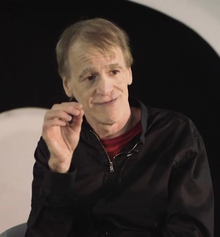Richard Zenith
Richard Zenith | |
|---|---|
 Richard Zenith in 2016 | |
| Born | February 23, 1956 |
| Nationality | American-Portuguese |
| Occupation | Writer and translator |
Richard Zenith (born February 23, 1956, Washington, D.C.) is an American-Portuguese writer and translator, winner of Pessoa Prize in 2012.
Life[]
Zenith graduated from the University of Virginia in 1979.[1] He has lived in Colombia, Brazil, France and Portugal since 1987 and holds Portuguese citizenship.[2][3]
Considered by many[4] an expert on Fernando Pessoa (former[5] Secretary of Culture called him "one of the greatest"),[6] he has translated the poet's works into English and has written extensively about Pessoa's poetry and prose. He has also translated Carlos Drummond de Andrade, Antero de Quental, Sophia de Mello Breyner, Nuno Júdice, António Lobo Antunes, and Luís de Camões, among other writers.[7]
Zenith organized, together with Carlos Felipe Moisés, the hugely successful exhibition Fernando Pessoa, Plural como o Universo, dedicated to Pessoa's life and heteronyms, at Lisbon's Gulbenkian Foundation,[8] São Paulo's Museum of Portuguese Language[9][10] and Rio de Janeiro's Centro Cultural Correios.[11]
In 2021 he published An Experimental Life, a 1,050 page biography of Pessoa.[12]
Awards[]
- 1987 – Guggenheim Fellowship[13]
- 1999 – PEN Award for Poetry in Translation
- 2006 – Harold Morton Landon Translation Award
- 2012 – Prémio Pessoa
Works[]
Translations[]
- Fernando Pessoa (2002). The book of disquiet. Translator Richard Zenith. Penguin Classics. ISBN 978-0-14-118304-6. (Carcanet 1991 edition)
- Fernando Pessoa (1999). Fernando Pessoa and Co.: Selected Poems. Translator Richard Zenith. Grove Press. ISBN 978-0-8021-3627-5.
- Fernando Pessoa (2002). The Selected Prose of Fernando Pessoa. Translator Richard Zenith. Grove Press. ISBN 978-0-8021-3914-6.
- Antonio Lobo Antunes (2001). The Natural Order of Things. Translator Richard Zenith. Grove Press. ISBN 978-0-8021-3813-2.
- Antonio Lobo Antunes (2004). The Inquisitors' Manual. Translator Richard Zenith. Grove Press. ISBN 978-0-8021-4052-4.
- Antonio Lobo Antunes (1996). Act of the Damned. Translator Richard Zenith. Grove Press. ISBN 978-0-8021-3476-9.
- José Luís Peixoto (2008). The Implacable Order of Things. Translator Richard Zenith. Random House, Inc. ISBN 978-0-385-52446-9.
- Fundação Calouste Gulbenkian (1995). 113 Galician-Portuguese troubadour poems. Translator Richard Zenith. Carcanet. ISBN 978-1-85754-207-3.
- João Cabral de Melo Neto (2005). Education by stone: selected poems. Translator Richard Zenith. Archipelago Books. ISBN 978-0-9749680-1-8.
- Sophia de Mello Breyner Andresen (1997) (January 1997). Log Book: Selected Poems. Translator Richard Zenith. Carcanet. ISBN 978-1-85754-364-3.
- Fernando Pessoa (2005). The Education of the Stoic: The Only Manuscript of the Baron of Teive. Translator Richard Zenith. D.A.P. ISBN 978-1-878972-40-8.CS1 maint: uses authors parameter (link) CS1 maint: others (link)
- Antero de Quental (1998). The Feeling of Immortality: Selected Writings. Translator Richard Zenith. Mermaid Turbulence. ISBN 978-1-901776-05-8.
- Nuno Judice (1997). Meditation on Ruins. Translator Richard Zenith. Archangel. ISBN 978-80-901800-8-6.
- Carlos Drummond de Andrade (2015). Multitudinous Heart: Selected Poems: A Bilingual Edition. Translator Richard Zenith. Farrar, Straus and Giroux.
Reviews[]
As a result, there can be no definitive edition of The Book of Disquiet. Written on and off over a period of more than 20 years, seemingly beginning as a book by another of Pessoa's heteronyms, Vicente Guedes, and slowly evolving into the imaginary testament of Soares, it is a dishevelled album of thoughts, sensations and imagined memories that can never be fully deciphered. Any version is bound to be a construction. In his notes on the text, Richard Zenith recognises this and suggests that readers "invent their own order or, better yet, read the work's many parts in absolutely random order". Despite this disclaimer, readers of Zenith's edition will find it supersedes all others in its delicacy of style, rigorous scholarship and sympathy for Pessoa's fractured sensibility.[14]
References[]
- ^ "Richard Zenith", Contemporary Authors Online, Gale, 2009.
- ^ "se tornou cidadão de Portugal por dedicação e louvor a uma obra, a de Fernando Pessoa, uma literatura, a nossa, e uma língua, a portuguesa". Publico newspaper online (in Portuguese). December 14, 2012. Retrieved December 14, 2012.
- ^ "he has had Portuguese nationality". Up Magazine. November 1, 2010. Retrieved December 14, 2012.
- ^ "Inês Pedrosa's statement, director of Fernando Pessoa's House, on Zenith's award". TSF (in Portuguese). December 14, 2012. Retrieved December 14, 2012.
- ^ pt:XIX Governo Constitucional de Portugal
- ^ "um dos melhores". Francisco Jose Viegas' blog "Origem das espécies" post (in Portuguese). December 14, 2012. Retrieved December 14, 2012.
- ^ Instituto de Estudos sobre o Modernismo, Faculdade de Ciências Sociais e Humanas, Universidade Nova de Lisboa (in Portuguese) http://www.fcsh.unl.pt/iemodernismo/richard%20zenith.htm. Retrieved December 14, 2012. Missing or empty
|title=(help) - ^ Fundação Calouste Gulbenkian (in Portuguese) http://www.gulbenkian.pt/index.php?article=1520&&langId=1. Retrieved December 14, 2012. Missing or empty
|title=(help) - ^ (in Portuguese) http://www.visitefernandopessoa.org.br/index2.html. Retrieved December 14, 2012. Missing or empty
|title=(help) - ^ Museu da Língua Portuguesa (in Portuguese) http://www.museudalinguaportuguesa.org.br/agenda_interna.php?id_agenda=446. Retrieved December 14, 2012. Missing or empty
|title=(help) - ^ Agência Brasil (in Portuguese) http://agenciabrasil.ebc.com.br/noticia/2011-03-26/rio-de-janeiro-recebe-exposicao-de-fernando-pessoa. Retrieved December 14, 2012. Missing or empty
|title=(help) - ^ Sexton, David (August 1, 2021). "Modernism's forgotten genius". Sunday Times.
- ^ http://www.gf.org/fellows/16311-richard-zenith
- ^ John Gray (May 28, 2001). "Assault on authorship. Fernando Pessoa invented at least 72 fictive identities. His jostling aliases, argues John Gray expressed his belief that the individual subject – the core of European thought – is an illusion". The New Statesmen. Retrieved July 21, 2021.
- 1956 births
- Living people
- Writers from Washington, D.C.
- University of Virginia alumni
- Portuguese–English translators
- Translators of Fernando Pessoa
- Pessoa Prize winners
- 20th-century translators
- American expatriates in Portugal
